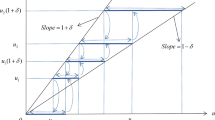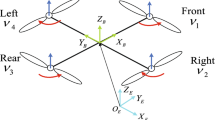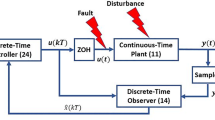Abstract
This paper studies the problem of designing adaptive fault-tolerant controllers for linear time-invariant systems with actuator saturation. New methods for designing indirect adaptive fault-tolerant controllers via state feedback are presented for actuator fault compensations. Based on the on-line estimation of eventual faults, the adaptive fault-tolerant controller parameters are updating automatically to compensate the fault effects on systems. The designs are developed in the framework of linear matrix inequality (LMI) approach, which can enlarge the domain of attraction of closed-loop systems in the cases of actuator saturation and actuator failures. Two examples are given to illustrate the effectiveness of the design method.
Similar content being viewed by others
References
Z. Wen, S. Roy, A. Saberi. On the disturbance response and external stability of a saturating static-feedback-controlled double integrator[J]. Automatica, 2008, 44(8): 2191–2196.
M. L. Corradini, G. Orlando. Linear unstable plants with saturating actuators: Robust stabilization by a time varying sliding surface[J]. Automatica, 2007, 43(1): 88–94.
H. Chen, F. Allgöwer. A quasi-infinite horizon nonlinear model predictive control scheme with guaranteed stability[J]. Automatica, 1998, 34(10): 1205–1218.
D. Q. Mayne, J. B. Rawlings, C. V. Rao, et al. Constrained model predictive control: Stability and optimality[J]. Automatica, 2000, 36(6): 789–814.
W. Chen, D. Ballance, J. OReilly. Optimisation of attraction domains of nonlinear MPC via LMI methods[C]//Proceedings of the 2001 IEEE American Control Conference. New York: IEEE press, 2001: 3067–3072
J. De Don’a, A. Seron, M. M. Mayne, et al. Enlarged terminal sets guaranteeing stability of receding horizon control[J]. Systems & Control Letters, 2002, 47(1): 57–63.
D. Limon, T. Alamo, E. F. Camacho. Stable constrained MPC without terminal constraint[C]//Proceedings of the 2003 IEEE American Control Conference. New York: IEEE Press, 2003: 4893–4898.
L. Magni, G. De Nicolao, L. Magnani, et al. A stabilizing model-based predictive control algorithm for nonlinear systems[J]. Automatica, 2001, 37(9): 1351–1362.
J. M. Gomes da Silva Jr., S. Tarbouriech. Anti-windup design with guaranteed regions of stability: an LMI-based approach[J]. IEEE Transactions on Automatic Control, 2005, 50(1): 106–111.
G. Grimm, J. Hatfield, I. Postlethwaite, et al. Antiwindup for stable linear systems with input saturation: An LMI-based synthesis[J]. IEEE Transactions on Automatic Control, 2003, 48(9): 1509–1525.
F. Wu, B. Lu. Anti-windup control design for exponentially unstable LTI systems with actuator saturation[J]. Systems & Control Letters, 2004, 52(3/4): 304–322.
D. Dai, T. Hu, A. R. Teel, et al. Control of saturated linear plants via output feedback containing an internal deadzone loop[C]//Proceedings of the 2006 IEEE American Control Conference. New York: IEEE Press, 2006: 5239–5245.
J. M. Gomes da Silva Jr., S. Tarbouriech, R. Reginatto. Analysis of regions of stability for linear systems with saturating inputs through an anti-windup scheme[C]//Proceedings of the 2002 IEEE Conference Control Applications (CCA/CACSD02). New York: IEEE Press, 2002: 1106–1111.
T. Hu, A. R Teel, L. Zaccarian. Anti-windup synthesis for linear control systems with input saturation: achieving regional, nonlinear performance[J]. Automatica, 2008, 44(2): 512–519.
Y. Cao, Z. Lin, D. G. Ward. An antiwindup approach to enlarging domain of attraction for linear systems subject to actuator saturation[J]. IEEE Transactions on Automatic Control, 2002, 47(1): 140–145.
F. Wu, Z. Lin, Q. Zheng. Output Feedback Stabilization of Linear Systems with Actuator Saturation[J]. IEEE Transactions on Automatic Control, 2007, 52(1): 122–128.
T. Hu, Z. Lin, B. M. Chen. An analysis and design method for linear systems subject to actuator saturation and disturbance[J]. Automatica, 2002, 38(2): 351–359.
F. Liao, J. Wang, G. Yang. Reliable robust flight tracking control: An LMI approach[J]. IEEE Transactions Control Systems Technology, 2002, 10(1): 76–89.
R. J. Veillette. Reliable linear-quadratic state-feedback control[J]. Automatica, 1995, 31(1): 137–143.
G. Yang, J. Wang, Y. C. Soh. Reliable H∞ controller design for linear systems[J]. Automatic, 2001, 37(5): 717–725.
G. Yang, K. Y. Lum. Fault-tolerant flight tracking control with stuck faults[C]//Proceedings of the 2003 IEEE American Control Conference. New York: IEEE Press, 2003: 521–526.
Q. Zhao, J. Jiang. Reliable state feedback control system design against actuator failures[J]. Automatica, 1998, 34(10): 1267–1272.
J. D. Boskovic, R. K. Mehra. Stable multiple model adaptive flight control for accommdation of a large class of control effector failures[C]//Proceedings of the 1999 IEEE American Control Conference. New York: IEEE Press, 1999: 1920–1924.
M. A. Demetrioui. Adaptive reorganization of switched systems with faulty actuators[C]//Proceedings of the 2001 IEEE Conference on Decision and Control. New York: IEEE Press, 2001: 1879–1884.
K. S. Kim, K. J. Lee, Y. D. Kim. Reconfigurable flight control system design using direct adaptive method[J]. Journal of Guidance, Control and Dynamics, 2003, 26(4): 543–550.
M. Mak, K. Hagino. Robust control with adaptation mechanism for improving transient behaviour[J]. International Journal of Control, 1999, 72: 1218–1226.
G. Tao, S. M. Joshi, X. Ma. Adaptive state feedback and tracking control of systems with actuator failures[J]. IEEE Transactions on Automatic Control, 2001, 46(1): 78–95.
Y. Zhang, J. Jiang. Integrated active fault-tolerant control using IMM approach[J]. IEEE Transactions on Aerospace and Electronic Systems, 2001, 37(4): 1221–1235.
T. Hu, Z. Lin. Control Systems with Actuator Saturation: Analysis and Design[M]. Boston: BirkhTauser, 2001.
A. E. Bryson. Control of Spacecraft and Aircraft[M]. Princeton: Princeton University Press, 1993.
Author information
Authors and Affiliations
Corresponding author
Additional information
This work was partly supported by Program for New Century Excellent Talents in University (NCET-04-0283), the Funds for Creative Research Groups of China (No.60521003), Program for Changjiang Scholars and Innovative Research Team in University (No.IRT0421), the State Key Program of National Natural Science of China (No.60534010), the Funds of National Science of China (No.60674021) and the Funds of PhD program of MOE, China (No.20060145019) and the 111 Project (B08015).
Wei GUAN is a Ph.D. candidate at the College of Information Science and Engineering, Northeastern University. His research interests include actuator saturation and state constraints.
Guanghong YANG is a professor at Northeastern University. His current research interests cover fault-tolerant control, fault detection and isolation, and robust control. He is also a senior member of IEEE, an associate editor for the International Journal of Control, Automation and Systems (IJCAS), and an associate editor of the Conference Editorial Board of IEEE Control Systems Society.
Rights and permissions
About this article
Cite this article
Guan, W., Yang, G. Adaptive fault-tolerant control of linear time-invariant systems in the presence of actuator saturation. J. Control Theory Appl. 7, 321–327 (2009). https://doi.org/10.1007/s11768-009-8067-5
Received:
Revised:
Published:
Issue Date:
DOI: https://doi.org/10.1007/s11768-009-8067-5




